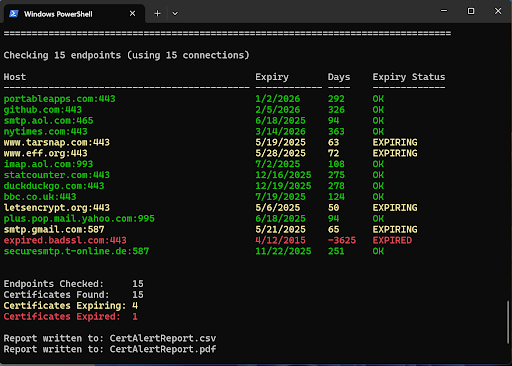Managing Digital Certificates
Best practices for enterprise certificate lifecycle management
Certificate Management Challenges
Businesses today are deploying an increasing number of digital certificates to secure communications between their applications, servers, and devices. An organization may have hundreds or possibly thousands of certificates installed on systems and devices throughout their global network.
As the number of certificates increases, so does the complexity of managing them effectively. Without a complete and detailed certificate inventory, an organization can't verify that certificates are within their validity period and in compliance with security policies. An expired or rogue certificate can have serious implications for business operations, security, and compliance.
Red Kestrel has developed a certificate discovery product called CertAlert that addresses this challenge. CertAlert scans your networks for SSL certificates using IP ranges or lists of hostnames, providing comprehensive visibility across your infrastructure.
The solution identifies all types of SSL certificates regardless of issuing Certificate Authority (CA), including SSL, Extended Validation (EV), and self-signed certificates. CertAlert provides detailed information about discovered certificates through in-depth reports giving you complete visibility of your certificate landscape.
Like passports, certificates are issued with a finite lifespan—typically one or two years. When certificates expire, they can no longer be used for secure communications, leading to service disruptions and security warnings that impact user experience and business operations.
Monitoring certificate expiration is therefore a critical task for any IT department. CertAlert proactively alerts administrators about certificates that are approaching expiration within a configurable timeframe, providing:
- Automated email notifications to designated recipients
- Configurable alert thresholds (30, 60, or 90 days from expiry)
- Scheduled monitoring to ensure continuous oversight
- On-demand expiration checking for immediate verification
Proactive Management
With CertAlert's proactive monitoring, you can ensure certificates are renewed well before expiration, preventing costly outages and maintaining business continuity.
Beyond expiration, certificates can present various security and compliance issues that need to be addressed. Red Kestrel's comprehensive solutions provide in-depth reports that highlight a range of certificate problems, including:
- Expired and soon-to-expire certificates
- Certificates created with weak hashing algorithms
- Keys shorter than NIST recommended minimums
- Certificates not issued by trusted CAs
- Hostname mismatches in certificates
- Certificates using known weak keys
By identifying these issues proactively, organizations can remediate potential security vulnerabilities before they impact security posture or compliance status.
The failure to replace expiring certificates can have serious consequences, including:
- Service outages affecting mission-critical systems
- Significant financial losses due to business disruption
- Reputation damage from customer-facing service failures
- Compliance violations and potential penalties
An effective certificate management strategy requires teams to maintain visibility into certificates approaching renewal periods (30, 60, or 90 days from expiry) so they can be renewed and installed in a timely manner. Red Kestrel tools help organizations maintain an up-to-date inventory of their certificates and create actionable lists of those requiring renewal.
By implementing a structured certificate lifecycle management process supported by automation, organizations can eliminate the risk of unexpected certificate expiration and ensure continuous secure operations.
Ready to strengthen your certificate management?
Discover how CertAlert can help your organization today.
